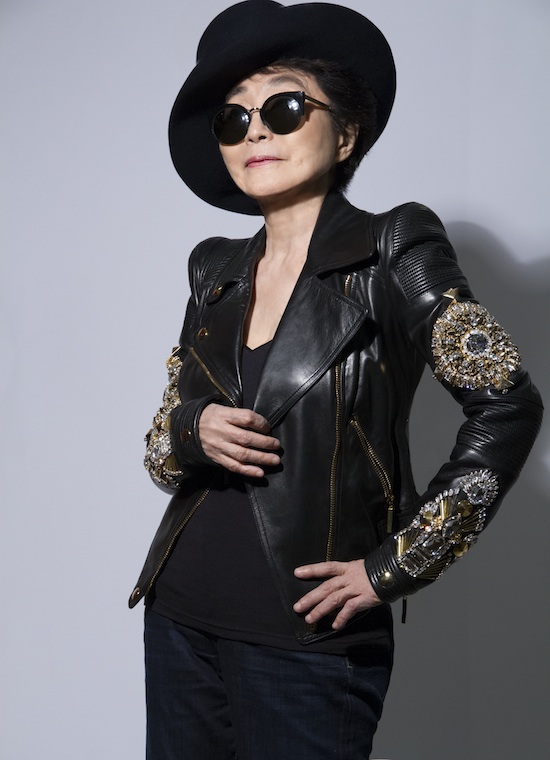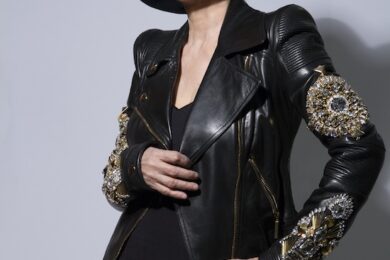Yoko Ono, now 80 years of age, has been busy. The past year has seen her To The Light show at the Serpentine, her retrospective Half-A-Room in Frankfurt, her book, Acorn, her curation of this year’s Meltdown and her opening performance there, and now her new record, Take Me To The Land Of Hell, produced by Yoko, her son Sean Lennon, and Cibo Matto’s Yuka Honda. Billed once again as Yoko Ono Plastic Ono Band, this iteration sees contributions from Cornelius and Cibo Matto, tUnEyArDs, Questlove, Nels Cline and Andrew Wyatt. Her music continues to aim itself at what she calls "the society": the global war machine, the political consensus on suffering, the difficulty of change. “We, the expendable people of the United States, ask to stop the violence, stop all wars,” she intones in ‘Cheshire Cat Cry’, before unleashing a howl of need and demand so gigantic it draws tears.
In conversation as in her work, she permits herself to make mistakes, to contradict herself, and to enjoy both. Grounded in the neo-Dadaist political techniques of the Fluxus movement, and with life experience of gigantic, tectonic loss – her family, her daughter, her husbands, who, she confesses in ‘Moonbeams’, the album’s opening track, "both left me housebound" – Ono has arrived at a moment of trust in herself. Though often accused of naivety or whimsy, hers is a confidence founded, she argues, in work, experience and difficulty rather than instinct. The distinction is important: while so many are dismissive about her, hateful towards her, her best response is her radical state of openness, her refusal to repeat herself. How ridiculous, she implies, to hate something that keeps changing, keeps moving – something that’s already next, already gone.
I love Yoko. You may have guessed.
Can you tell me the story of the album?
Yoko Ono: Well did you listen to the album?
Yes, lots.
YO :OK, then you know the story!
Much of your work has been in collaboration, and I’m wondering what leads you to your collaborators.
YO: They’re friends, they know my work, and they didn’t have to come and help me, but they did. Isn’t that great?
You have strong working relationships with Yuka Honda and with Cornelius, for example – is there something special for you about working with artists from a Japanese background?
YO: Well, I wasn’t selecting them from that idea, I didn’t think (funny voice) "I need people from different backgrounds", they were just people that I love.
How is it for you working with Sean? Trusting your son to produce the record?
It’s so great. You just wouldn’t believe it. First of all I was advised by my friends, you know – they said don’t ever work with your own son, that’s the worst thing you can do. And I think that’s a normal reaction, but I thought maybe we should take a chance, you know, because we’re very… different. And also, when people say "don’t don’t don’t", I get, you know… the other way around. So I thought, why don’t we DARE to do this. And it was working very well.
I have so much respect for my son, because it’s not very easy to work just for someone else’s album. You know, he’s his own musician, and he’s right now creating his own record and all that. So, he’s just a very delicate and sensitive attitude about it. And he’s good, he’s a talent himself, you know. Which one did you like best?
‘Moonbeams’, I think. I listened to it a lot before I even played the rest of the album through.
YO: Oh that’s great! ‘Moonbeams’ was really a different kind of attempt. I think I am trying to make a difference in the culture, you know. It’s always good to do something that is not a repeat. I just don’t believe in repeating, you know.
While I was researching this interview I came across this quote from you, it’s an interview from 1999, but you’re talking about your work in the seventies, can I read it to you?
YO: Yes! Read it!
You said, "I was doing very musically intricate things, in terms of rhythm and notation and how it moves. I thought it was comparable to someone like Schoenberg in terms of the structure of the music, and they didn’t hear that at all. They just said ‘Yoko’s screaming!’"
YO: Is that terrible? Is it terrible? For some people it is. I don’t think that I am screaming ENOUGH. I mean, look at what’s happening in the world. But then the thing is, if I had screamed as much as is happening in the world, well, nobody’s going to listen to that.
Moving back to the idea of you as a technical musician, Schoenberg and the 12-tone technique and all that, do you ever use non-traditional scales? Non-Western scales?
YO: [firmly] No.
And technical work, is that something you’re doing now, or are you unable to repeat that?
YO: [laughs] I trust in my instinct and inspiration, really, and that’s difficult you know, because sometimes you would rather be technical. But if you stop all that, and just try to be in your instinct, in what is inspiring you, and its difficult you know, because sometimes you think, well that’s not right, but… that’s what I do now.
I’m very interested in the instinct of an 80 year old transnational feminist.
YO: Well, I said instinct, but actually I don’t know anything about instinct, ha, so I shouldn’t have said that. It’s inspiration. You get old, you know – it’s inspiration. I think of it as something my instinct approves. So I go by that. And once you empty your mind, empty your brain. It’s really incredible. I’m very caring about things that dash into my brain, and I make sure I don’t just clog it with that.
So what comes out of the body when you work like that? How is it to try and push that voice out of the body?
YO: No, it’s just something that’s within me, WITHIN me. And within a body-in-mind that has accumulated in 80 years, and that’s a lot, you know. I think it’s a fortunate thing that it’s been accumulated that long, its almost like discussing a good wine, you know. It took a long time to be what it is. I am very very caring about it in the sense that I try to bring it out, as it is.
You’re associated in the public mind with the peace movement and with nonviolence, and on this record again you say, "Who needs violence, who needs war, who needs it?" But I think some of your work’s quite violent, in a way that’s helpful to me. Maybe I need it! What is the role of violence in your work?
YO: Violence in my work? Well I’m not avoiding it. People say, well she’s supposed to be a peacenik, and why is she talking about wanting to kill someone! But it’s all right, you know, and some people in fact write to me saying, "Sometimes I have violent thoughts, what can I do?" So I say, "Well, have [them]!" Cos you know, we should not try to control ourselves. It’s very bad to control ourselves in this sense. If you have any emotion at all, if its a bad emotion or good emotion, think about it, you should just understand that you have those emotions. And it’s good, you know, because we are people and we have all these emotions. And the result of that, is you would become more and more peaceful. If you don’t let those emotions be inside of you then you become extremely violent.
Do you think of love and peace as universal concepts?
YO: Well I think they are individual and universal. Love is an incredibly strong thing, it goes everywhere, it’s like water, you can’t stop it. Love, once you have it, once you create a kind of pathway for it to come out, it just keeps on coming out.
Because the way you use the terms, I would argue, is pretty specific. For example, when you say, at the end of ‘Revelations,’ "I love you," I hear that very differently from the way I would usually hear those words. What is your project of love?
YO: Well, you know, it’s difficult to explain love. You want to explain water? You need a book for it. There are many different ways to explain what water is. Love is big, it’s very big. I know that I have tons of it, and I am sure that you do too. But maybe we don’t want to open up so much, and we think, maybe we don’t have so much, but yes, you know that you have tons of love. We all do. Through that love we can connect, we can heal each other, we can make people, all of us, happy, joyful, and make a better world.
What are the politics of that?
YO: No, no, I don’t think of anything as political and not political. I am giving part of me, and you might see that as political. But I think it’s more than just political, it’s something that you can’t label. A nice little magic that you would enjoy, probably.
I had a big discussion with someone the other day about whether you’re a feminist or not. Do you identify with that word?
YO: Well, honestly I don’t think of myself with those words, I think that is a kind of insult to other women, because all women are feminists, and these days a lot of men are feminists. Being a feminist is allowing woman to be natural, for what she is, whatever it is. All of us can be natural and we’re all feminists in that sense. Because society was built on male power, and women’s power was… ignored is the best word to describe it I suppose, we have been running society on one power, half a power really. And that’s so terrible. The world needs women’s power too.
You’re still working long after most people have hung up their boots. What are your remaining ambitions?
No, I don’t think that way. Whatever comes to me at the time, and if I have the time, I just bring it out. And I’m hoping that I have enough time to bring out some of the songs that I didn’t put on this album. I mean, this album’s good as it is, but I’m thinking about the next one. I don’t think of myself with those words, ambition. I’m just trying to do my best every day, hoping that I have done my best every day, and its very easy in a way, but also it’s not that easy. Every day counts.



